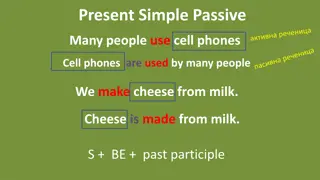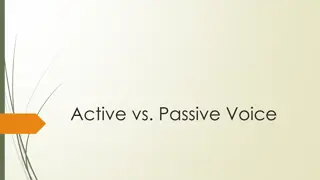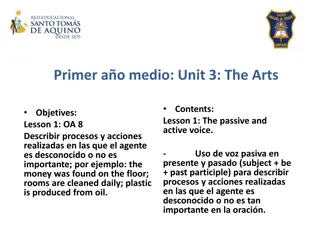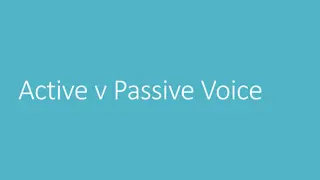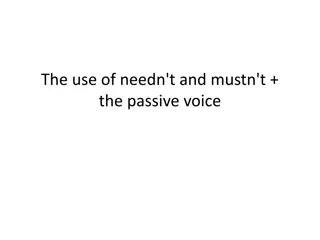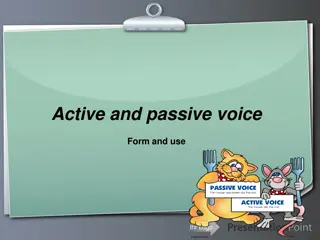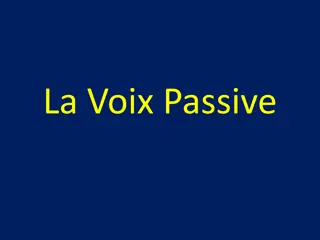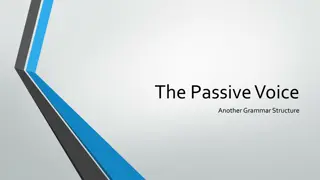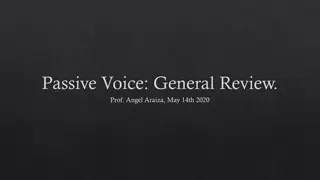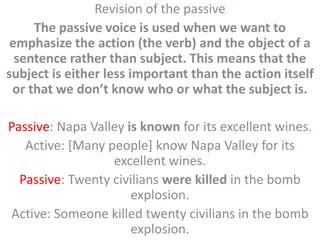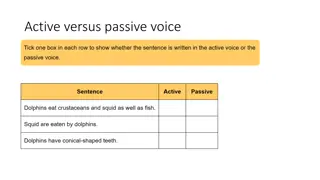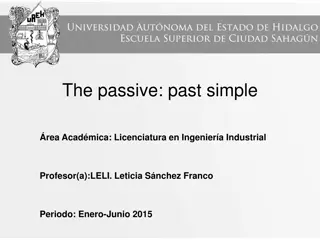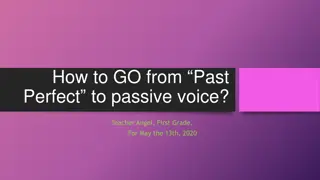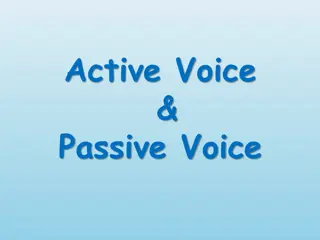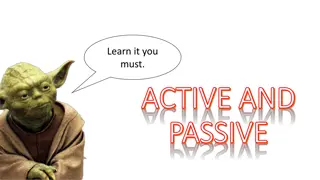Passive verb forms
Passive verb forms involve using "be" in a specific tense along with the past participle of a main verb to change the object of an active sentence into the subject of a passive sentence. The passive voice is commonly used in formal writing when the doer of the action is unknown, obvious, or purposel
2 views • 13 slides
Understanding Active and Passive Voice in English Grammar
Learn about active and passive voice in English grammar with clear explanations, examples, and rules. Discover how to transform sentences from active to passive voice while maintaining tense and meaning. Explore different tenses and their formations in both singular and plural contexts.
11 views • 14 slides
Understanding Active and Passive Voice Usage
Learn about the differences between active and passive voice in English grammar, how to convert sentences from active to passive voice, and examples of active and passive voice usage in different tenses. Understand which verbs can be used in passive voice constructions and practice changing sentence
9 views • 7 slides
Active and Passive Voice Rules for All Tenses: Present Simple, Continuous, and Perfect
Exploring the rules of active and passive voice for different tenses like Present Simple, Continuous, and Perfect. Understand the structure and examples for each tense to master the transformation between active and passive voice forms.
1 views • 20 slides
Learning Passive Voice in Present Simple Tense: Exercises and Examples
Explore the passive voice in present simple tense through examples and exercises. Understand how to form passive sentences with regular and irregular verbs. Practice converting active sentences into passive voice for a deeper grasp of English grammar concepts.
1 views • 8 slides
Understanding Passive Voice in English Grammar
Explore the concept of passive voice in English grammar through examples and explanations. Learn how to identify passive voice, transform active voice sentences into passive voice, and understand the importance of focusing on the action rather than the doer. Discover the structure of passive voice s
2 views • 7 slides
Understanding Active and Passive Voice in Writing
Active Voice is when the subject performs the action, while Passive Voice is when the subject receives the action. Writers often choose Active Voice for clarity, but Passive Voice is useful when emphasizing the receiver or if the doer is unknown. Avoid mixing voice types to maintain consistency in w
1 views • 6 slides
Exploring the Passive Voice in English Language
The passive voice is used in English to shift the focus from the subject of a sentence to the object. It is commonly used when the agent of the action is unknown, to avoid responsibility or blame, and to enhance cohesion and coherence in writing. By starting sentences with given information and main
5 views • 9 slides
Understanding Passive Voice and Verb Forms in English
Explore the concept of passive voice in English grammar through examples and explanations of modal verbs, infinitives, gerunds, and verb forms. Learn how to form passive sentences and identify different verb structures. Practice converting active voice sentences to passive voice for a deeper underst
1 views • 9 slides
Mastering Writing Skills & Passive Voice: Lesson Review
Learn how to identify sequencing phrases, read for specific information, describe a process using passive voice, and write process descriptions. Also, understand the structure of passive sentences and when to use the by-agent in passive voice constructions.
2 views • 16 slides
Understanding Passive and Active Voice in English Language
Learn about the passive and active voice in English grammar, focusing on describing processes and actions where the doer is unknown or unimportant. Explore examples, differences between active and passive voice, and how to convert sentences from active to passive voice. Practice activities to enhanc
1 views • 12 slides
Understanding Active vs Passive Voice in Writing
Active vs passive voice explained with examples, definition, and two ways to fix passive voice. Learn how to change passive voice sentences to active voice with practical examples provided.
8 views • 5 slides
Understanding Active and Passive Voice for Better Communication Skills
This content covers essential aspects of active and passive voice in communication skills. It explains the difference between the two voices, provides examples, and clarifies when to use passive voice. The importance of transitive verbs in forming passive sentences is highlighted along with intransi
3 views • 29 slides
Effective Use of "Needn't" and "Mustn't" in Passive Voice
Understanding when to use "needn't" and "mustn't" in the passive voice can enhance your language skills. "Needn't" is used to express lack of necessity, while "mustn't" indicates prohibition or strong advice. Incorporating these modal verbs in the passive voice adds depth and clarity to your communi
0 views • 4 slides
Learn How to Form Passive Voice in English
Passive voice in English is formed using the verb "to be" and the Past Participle form of the verb. This article covers various tenses in passive voice with examples and images for better understanding.
2 views • 8 slides
Examples of Passive Voice and Simple Present Tense in English
Explore various examples of passive voice and simple present tense usage in English sentences, including questions and statements with explanations. Understand how to form passive voice and identify simple present tense sentences through practical examples.
0 views • 15 slides
Understanding the Passive Voice and Versatile Verbs
Explore the concept of the passive voice and versatile verbs, including examples and reasons for using passive voice constructions. Learn about verb tenses, when to use passive voice for cohesion or when the agent is unknown, and how to add modifiers to the agent. Discover tips for using passive voi
0 views • 15 slides
Mastering Passive Voice: Verb Forms and Usage
Delve into the intricacies of passive voice in English grammar, exploring verb forms commonly used in the passive voice such as manufacturing, publishing, and more. Learn how to construct passive sentences in Present Simple and Past Simple tenses with examples and practice exercises. Enhance your un
0 views • 6 slides
Understanding Active and Passive Voice in English Writing
Explore the forms and uses of active and passive voice in English writing with examples and explanations. Learn how to distinguish between active and passive voice, create passive sentences using appropriate tenses, and understand when to use each voice effectively in different situations. Enhance y
0 views • 15 slides
Understanding Passive Voice in English: Usage and Examples
Passive voice is used to shift the focus from the subject to the object in a sentence. The passive construction is formed with the verb "to be" in the appropriate tense followed by the past participle of the main verb. Learn when to use passive voice, how to indicate the agent using "by," and how ad
0 views • 6 slides
Practice with Passive Voice in English
Learn how to form affirmative and question sentences using the passive voice in English. Understand the structure and rules for using passive voice effectively through examples such as the founding of Jamestown, the first Thanksgiving celebration, adoption of the Declaration of Independence, and ele
0 views • 14 slides
Understanding Active and Passive Voice in Writing
Active and passive voice are two important concepts in writing that determine whether the subject or object performs the action of the verb. This tutorial by Alice Frye, Ph.D., explains the goals, differences, and applications of active and passive voice in psychology writing. By the end of the tuto
0 views • 19 slides
Understanding the Passive Voice: Usage and Conversion
Delve into the concept of the passive voice, learning why and when it should be used. Explore examples, steps for converting active to passive voice, and its relevance in different contexts like newspapers, scientific papers, and legal documents.
0 views • 16 slides
Understanding Passive Voice and Verbal Times
Passive voice focuses on the object of the sentence, with examples of converting sentences from active to passive voice in different verbal tenses. It explains the concept of subject giving an object in active voice and the reception of the object in passive voice. The importance of subject in a sen
0 views • 9 slides
Understanding Passive Voice: Rules and Examples
Passive voice is a grammatical construction used when the focus is on the action itself rather than the doer. It is formed by combining a form of "to be" with the past participle of a verb. This content explores the usage of passive voice in different tenses - present simple, present continuous, pas
0 views • 14 slides
Understanding Passive Voice in English Grammar
This content covers the concept of passive voice in English grammar, providing examples and explanations of how to form passive voice sentences. It includes information on intransitive and transitive verbs, transforming active voice to passive voice, and common passive voice structures. Visual aids
0 views • 16 slides
Understanding the Passive Voice in English Writing
The passive voice in English writing is utilized to emphasize the action and object of a sentence rather than the subject. It is helpful for shifting the focus of a sentence, especially when the subject is less important or unknown. Learn about the passive voice, verbs with two objects, passive in s
0 views • 7 slides
Mastering Passive Voice in English: Structure, Practice, and Examples
Explore the concept of passive voice in English, including why and how to use it. Learn the structure of passive sentences, with examples and step-by-step instructions. Practice making passive sentences from active ones. Understand when and why passive voice is commonly used by English speakers.
0 views • 6 slides
Understanding Passive Voice in Pennsylvania Dutch
Passive voice in Pennsylvania Dutch (PD) involves the subject of the sentence not performing the action but having the action done to them. PD uses forms of "waerre" and the past participle to form passive sentences. The presence of an agent in passive sentences is indicated using the dative preposi
0 views • 6 slides
Mastering Active and Passive Voice in English: A Comprehensive Guide
Explore the fundamental concepts of active and passive voice in English through this detailed guide. Learn how to identify and transform sentences from active voice to passive voice, understand the usage of auxiliary verbs, and practice changing sentence structures effectively. Enhance your language
0 views • 19 slides
Learn Grammar: Active and Passive Voice Conversion Exercises for Class Eight English
This lesson focuses on changing active voice sentences into passive voice, covering various examples with explanations. Through visual aids and practical exercises, students will grasp the concept and apply it effectively. The content includes converting sentences, identifying passive voice structur
1 views • 17 slides
Understanding Active and Passive Voice in English Grammar
Explore the difference between active and passive voice with examples and explanations. Learn how to identify subjects, verbs, and objects in sentences. Discover the characteristics of active and passive verbs, and how emphasis and formality can be affected by using either voice in writing.
0 views • 13 slides
Understanding Active and Passive Voice in English Grammar
Learn about active and passive voice in English grammar with examples and practice exercises. Understand the difference between active and passive voice, how to form sentences in both voices, and practice converting sentences from active to passive voice. Improve your language skills with this compr
1 views • 19 slides
Practice Passive Voice in Simple Past Tense
Learning about the passive voice in the past simple tense through examples and exercises focusing on emphasizing the object over the subject. Explore how to form passive voice sentences and practice with famous inventions and historical events. Enhance your understanding of verb tenses and sentence
0 views • 18 slides
Transforming Sentences from Past Perfect to Passive Voice
Learn how to convert sentences from the Past Perfect tense to Passive Voice with clear examples and a step-by-step guide. Understand the formula and rules for changing active voice sentences to passive voice sentences in English grammar. Explore how singular and plural subjects affect the transforma
0 views • 9 slides
Understanding Passive Voice in English Grammar
Passive voice in English occurs when the subject receives the action of the verb. This involves changing the order of subject and object, using the auxiliary verb "to be" in the tense of the active voice, and adding the past participle of the main verb. Various tenses can be used in passive voice co
1 views • 5 slides
Understanding the Passive Voice in English Writing
Learn how to emphasize actions over individuals by using the passive voice in English writing. Explore examples of passive constructions and understand when and how to effectively utilize them in your writing. Master the concept of the passive voice to enhance the clarity and impact of your written
0 views • 14 slides
Learn Passive Voice in Present Simple and Past Simple Tenses for 9th Grade
Explore examples and practice sentences to understand how to form passive voice in present simple and past simple tenses. Learn how to transform active voice sentences into passive voice and enhance your English grammar skills effectively.
0 views • 10 slides
Understanding Active and Passive Voice in Grammar
Active and passive voice are forms of verb usage where the subject either performs the action (active voice) or receives the action (passive voice). Examples and explanations provided to grasp the concept effectively.
0 views • 5 slides
Mastering Active and Passive Voice Conversions
Explore the nuances of active and passive voice transformations with practical examples and guidelines. Learn how to convert sentences from active to passive voice efficiently using general rules, tense identification, pronoun changes, and more. Enhance your writing skills and understand when to eff
0 views • 11 slides




